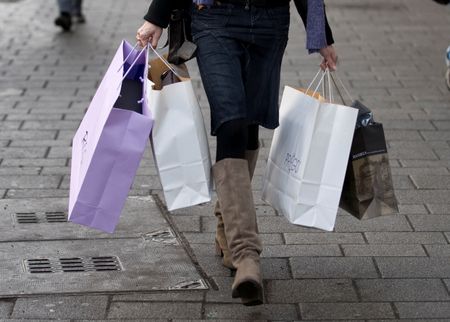By Maria Martinez
BERLIN (Reuters) -German retail sales in February exceeded expectations but a rise in import prices pointed to a looming surge in inflation, potentially dampening consumer spending, according to data published on Monday.
Retail sales rose by 0.8% compared with the previous month, data showed on Monday. Analysts polled by Reuters had predicted a 0.2% increase.
The statistics office also revised January data to a 0.7% increase instead of the previously reported 0.2%.
“This is very good news for growth in the first quarter,” said Thomas Gitzel, chief economist at VP Bank.
The German economy contracted in the final quarter of last year, reigniting recession fears. A recession is defined as two consecutive quarters of negative growth.
However, economists do not expect a consumption spree, and uncertainty over Germany’s economic prospects has increased after U.S. President Donald Trump announced a 25% tariff on imported vehicles. This is expected to hit German automakers particularly hard, as well as the wider economy after two consecutive years of contraction.
“The bad mood among consumers is a dent in further spending enthusiasm,” said Alexander Krueger, chief economist at Hauck Aufhaeuser Lampe Privatbank.
A greater willingness among Germans to save is hindering a more significant recovery in consumption, a survey showed on Friday.
“Worries about one’s own job are currently increasing as a brake on consumption,” Krueger said.
The number of unemployed increased by 26,000 in March to 2.92 million, approaching the 3 million mark for the first time in 10 years.
“The savings rate is still high, households are tending to refrain from spending,” said Stefan Genth, managing director of the retail association HDE, adding that a more positive dynamic in retail sales was therefore unlikely for now.
INFLATION AHEAD
February data showed import prices up 3.6% year-on-year, the sharpest rise in more than two years due to higher food prices.
Since the German economy purchases many primary products and raw materials from abroad, higher import prices are reflected in inflation data with a time lag.
Germany will publish national inflation data for March later on Monday, with the rate expected to slow to 2.4% from 2.6% the previous month.
The already published state CPI data point to an unchanged German inflation rate in March, said Claus Vistesen, chief eurozone economist at Pantheon Macroeconomics.
Inflation accelerated in Saxony and Hesse but slowed in Bavaria and Baden-Wuerttenberg and remained unchanged in Brandenburg and North Rhine-Westphalia.
The German data comes ahead of the euro zone inflation release on Tuesday. Inflation in the bloc is expected at 2.3% in March, unchanged from the previous month, according to economists polled by Reuters.
(Additional reporting by Ozan Ergenay and Rene Wagner, Editing by Rachel More and Gareth Jones)










